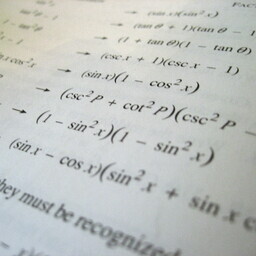Järgmisel nädalal saavad kõik huvilised proovida e-rehkendust.
EN
Next week, all interested parties can try e-calculation.
Nad saavad lahendada matemaatika ülesandeid esimesest kuni 12. klassini.
EN
They can solve mathematics problems from the first to the 12th grade.
Aktuaalne kaamera uuris, kuidas matemaatika õpetamine on muutunud.
EN
Current camera investigated how mathematics teaching has changed.
Samuti vaadati, kuidas
õpikud ja töövihikud on muutunud
õpikud ja töövihikud on muutunud
Tõlge fraasile: õpikud ja töövihikud on muutunud
EN
textbooks and workbooks have changed
.
EN
Also, it was observed how textbooks and workbooks have changed.
Tallinna Toomkooli õpilased harjutasid murdude jagamist.
EN
Students from Tallinn Toom School practiced dividing fractions.
Nende õpetaja on matemaatikat õpetanud juba 25 aastat.
EN
Their teacher has been teaching mathematics for 25 years.
Õpetaja ütleb, et lapsed kasutavad palju kalkulaatorit.
EN
The teacher says that children use calculators a lot.
Nad ei püüa peast arvutada, isegi väikseid tehteid.
EN
They do not try to calculate mentally, even small operations.
Õpetaja arvab, et see vähendab
mõtlemise kiirus
mõtlemise kiirus
Tõlge fraasile: mõtlemise kiirus
t.
EN
The teacher thinks that this reduces the speed of thinking.
Tehnoloogia abil on lihtne arvutada, aga see ei arenda mõtlemist.
EN
With the help of technology it is easy to calculate, but it does not develop thinking.
Matemaatika ei ole ainult arvutamine.
EN
Mathematics is not only calculation.
Matemaatika aitab näha mustreid maailmas.
EN
Mathematics helps to see patterns in the world.
See aitab maailma paremini mõista ja tõlgendada.
EN
It helps to understand and interpret the world better.
Matemaatika tunnid võivad olla keerulised.
EN
Mathematics lessons can be difficult.
Kui jätta paar kuud vahele, on raske jälle alustada.
EN
If you leave it aside for a few months, it is difficult to start again.
Matemaatikas pead startima algusest, mitte keskelt.
EN
In mathematics, you have to start from the beginning, not from the middle.
Õpilased Nora ja Oskar ütlevad, et tundides peab aktiivselt osalema.
EN
Students Nora and Oskar say that you have to participate actively in lessons.
Nad õpivad kiiresti uusi teemasid ja liiguvad edasi.
EN
They quickly learn new topics and move on.
Eesti Hoiuraamatukogust leiab vanu õpikuid ja töövihikuid.
EN
From the Estonian Treasury Library you can find old textbooks and workbooks.
Nora ja Oskar lahendasid 1991. aasta töövihikust ülesandeid.
EN
Nora and Oskar solved problems from a 1991 workbook.
Õpetaja ütleb, et ülesanded on peaaegu samad, aga vorm on muutunud.
EN
The teacher says that the tasks are almost the same, but the form has changed.
Uuringud näitavad, et ainult 10% õpilastest saab iseseisvalt õpikuga töötada.
EN
Studies show that only 10% of students can work independently with a textbook.
See tekitab küsimuse, kas õpik on õpetaja või õppija jaoks.
EN
This raises the question of whether the textbook is for the teacher or the learner.
Nora ja Oskar räägivad, millised õpikud neile meeldivad.
EN
Nora and Oskar talk about which textbooks they like.
Nora eelistab uut töövihikut, sest seal on rohkem lihtsustatud asju.
EN
Nora prefers the new workbook because there are more simplified things.
Oskar ütleb, et tema meeldib rohkem vana töövihik.
EN
Oskar says that he likes the old workbook more.
Talle meeldib, kuidas see näeb välja nagu vana tarkus.
EN
He likes how it looks like old wisdom.

